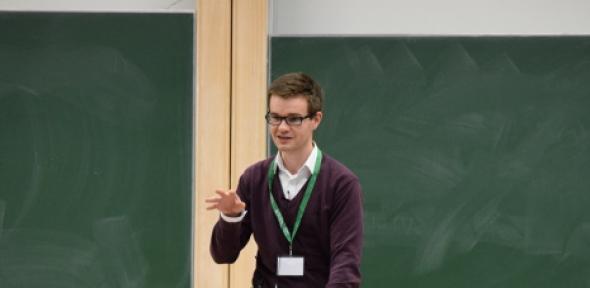
Jack Thorne, Professor of Number Theory in the Department of Pure Mathematics and Mathematical Statistics (DPMMS), has been elected as the new Kuwait Professor of Number Theory and Algebra with effect from 1 January 2024.
Number theory has been a historical strength of mathematics in Cambridge and I feel very fortunate to be in a position to carry on this story. Jack Thorne
The Kuwait Professorship of Number Theory and Algebra was established in 2000, following a generous benefaction from the Kuwait Foundation for the Advancement of Sciences. The Professorship is held in DPMMS, and is held by candidates with an outstanding research record of international stature and the vision, leadership, experience and enthusiasm to establish a leading research presence. Thorne takes over as Kuwait Professor following Tony Scholl.
"I am delighted to have been elected as the next Kuwait Professor in DPMMS," says Thorne. "Number theory has been a historical strength of mathematics in Cambridge and I feel very fortunate to be in a position to carry on this story."
The election to the professorship recognises Thorne's outstanding work. He has already won a number of prizes, including the AMS Cole Prize in Number Theory in 2023, the prestigious New Horizons in Mathematics Prize in 2022, and the SASTRA Ramanujan Prize in 2018. Thorne became the youngest living fellow of the Royal Society when he was elected in 2020.
Thorne's work is focused on the Langlands programme, a web of far-reaching conjectures made by Robert Langlands in the 1960s that link number theory to geometry and analysis. In particular, they link objects in number theory that are comparatively basic (such as diophantine equations) to more complex mathematical objects from geometry, called automorphic forms.
"They are two worlds [for] which, a priori, it is not clear they should be connected, but [which] talk to each other in ways that are very mysterious and very striking. It's really like there's a hidden telephone line," says Thorne. "Automorphic forms are difficult to define and difficult to study, but if you can show that there is this link between the number theoretic world and the automorphic world, then you can often learn an awful lot about the number theoretic world you started off in."
The Langlands programme is seen by many as the single biggest project of modern mathematics. Once all of its conjectures are proved, the result will be akin to a grand unified theory for mathematics. Thorne's work has provided important steps along this road. (To find out a little more, see a previous article about Thorne's work).
Thorne is looking forward to his new role. "DPMMS is a wonderful place to do mathematics and continues to attract some of the world's brightest researchers. I am especially excited about the prospect of taking on more PhD students in the next few years – and seeing what we can learn from each other!"
